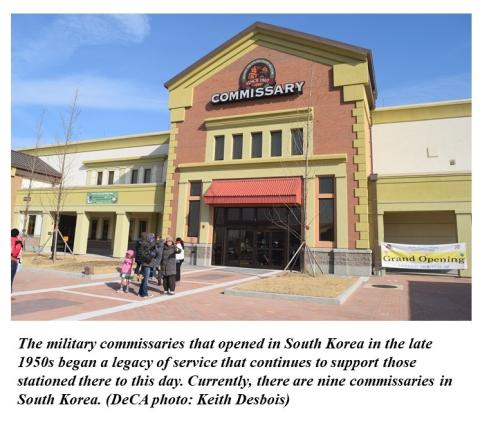ARMISTICE DAY: On July 27, commissaries join nation in honoring the service, sacrifice of 1.8 million Americans who fought during Korean War

FORT LEE, Va. – Nearly 1.8 million Americans fought during the Korean War, and around 750,000 Korean War veterans remain living in the U.S. as of 2025.
On July 27, 2025, the Defense Commissary Agency (DeCA) joins all Americans in observing the 72nd anniversary of the Korean Armistice Agreement signed in 1953 in Panmunjom, on the border between the Republic of Korea (South) and the Democratic People's Republic of Korea (DPRK) (North). This armistice ended active hostilities in the Korean War that began June 25, 1950, when North Korean forces crossed the 38th parallel separating the two countries.
The National Korean War Veterans Memorial was completed and dedicated July 27, 1995. On that day President Bill Clinton signed an amendment to U.S. Code Title 36 declaring July 27 as Korean War Veterans Armistice Day. The president issues an annual proclamation to honor that day.
“Korean War Veterans Armistice Day is a national day of recognition that honors the U.S. service members who served, laid down their lives, and are still missing in action,” said Navy Command Master Chief Mario Rivers, senior enlisted advisor to the DeCA director. “As we mark this milestone, may we always remember their bravery and sacrifice in defense of democracy.”
Leading up to the armistice, North Korean forces had captured the South Korean capital of Seoul before United Nations forces, led by the United States, pushed them back all the way to the border of Korea and China.
By November 1950 China had entered the war. The war raged until the United States, North Korea and China signed the armistice agreement to end hostilities. South Korea never did sign the armistice because it was strongly against a divided Korea.
Meanwhile, during that period, the American commissary food standards were reportedly the best in the world, wrote Defense Commissary Agency (DeCA) historian, Dr. Peter Skirbunt, in “The Illustrated History of American Military Commissaries.”
The advertising industry was at its peak, Skirbunt said, and both civilian grocery stores and military commissaries started promoting their products. Television and radio commercials aired throughout the day to entice consumers, and inside the stores, elaborate displays and bright colors grabbed shoppers’ attention.
By this time, commissaries were all self-service versus having customers hand a list to a clerk behind a counter. Customers walked through the stores and selected their own items. There was a much larger variety of products by 1950, and nationally branded items were available in all commissaries. Plastic film and wrapping machines allowed for prepared, pre-packaged fruits and vegetables in many commissary stores.
It was during the Korean War, on Jan. 1, 1952, that a surcharge started being collected at all U.S. Army commissaries. The surcharge was used to pay for operating equipment, supplies, utilities, and merchandise losses and spoilage.
From 1953 to 1959, there were six major supply points for ground troops in South Korea. Three of them issued rations and made bulk sales: Supply Point 46 at Taejon, Supply Point 41 at Seoul and the 55th Quartermaster Depot at Ascom City. The remaining three only issued rations: Supply Point 48 at Busan (previously anglicized as Pusan), Supply Point 47 at Taegu and Supply Point 39 at Uijongbu.
Families could not accompany members of the armed forces to duty stations in South Korea until the late 1950s, after the political and military situations stabilized. This prompted the start of several commissaries in country.
In 1959, for instance, stores opened at Army posts at Camp Walker, Camp Henry and Supply Point 47 in Taegu. Commissaries opened at Naval Air Station Chinhae; Seoul; and Camp Hialeah (at Busan) in 1961.
Stores continued to open in South Korea throughout the 1960s, including at Hannam Village in 1968. In the early 1970s, stores opened at the key Air Force base at Osan and the Army base at Yongsan. Through 2006, commissaries also opened at Camps Carroll, Casey, Edwards, Howze, Humphreys, Page, Red Cloud and Stanley.
The military commissaries that opened in South Korea in the late 1950s began a legacy of service that continues to support those stationed there to this day.
Currently, there are nine commissaries in South Korea: Camp Carroll, Camp Casey, Camp Humphreys, Chinhae, Daegu, K-16 Air Field, Kunsan Air Base, Osan Air Base and Yongsan. These commissaries are a vital resource for service members and their families, providing them with affordable groceries and household goods.
-DeCA-
About DeCA: The Defense Commissary Agency operates a worldwide chain of commissaries providing groceries to military personnel, retirees, disabled veterans and other authorized patrons and their families in a safe and secure shopping environment. Commissaries provide a military benefit, saving authorized patrons thousands of dollars annually on their purchases compared to similar products at commercial retailers. The discounted prices include a 5-percent surcharge, which supports the costs of building, modernizing and sustaining commissary facilities. A core military family support element and valued part of military pay and benefits, commissaries contribute to family readiness, enhance the quality of life for America’s military services and their families, and help recruit and retain the best and brightest men and women to serve their country.
